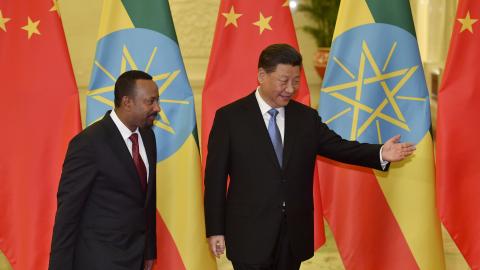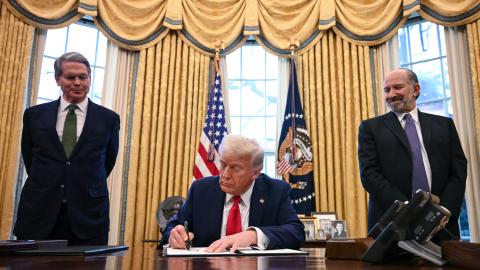In a move that has sent shockwaves throughout Egypt, the Coptic Pope, Tawadros II, travelled to Jerusalem Thursday at the head of a distinguished delegation of bishops from the Coptic Church. The short flight from Cairo to Tel Aviv can be measured in minutes; the psychological distance stretches back decades.
It is the dream of every Copt to make the pilgrimage to Jerusalem before one’s death, and for centuries the Copts did. In the process, the Coptic community acquired a dozen churches and several monasteries in the Holy Land as well as partial rights to the Church of the Holy Sepulcher. After the six-day war in June 1967, it became impossible to make the pilgrimage with Egypt and Israel at war.
Those who held hopes that the peace treaty between Egypt and Israel in 1979 would open the gates of Jerusalem to Coptic pilgrims were quickly disappointed as the late Pope Shenouda III (1971-2012) quickly made his decision known: No Copt would be allowed to travel to Jerusalem for the pilgrimage. Copts would only enter Jerusalem with Muslims, he declared. The decision was purely political, with the man once described as Egypt’s most astute politician reasoning that if Copts went to Israel for the pilgrimage, the rest of the Arab world would see them as traitors. Many sins could be forgiven in the Arab world, he presumably reasoned, but visiting Israel is not one of them.
Personal animosity may also have played a role. As a young man, Shenouda had fought in the 1948 war, and throughout his life he continued to hold the anti-Semitic position that Jews were responsible for killing Christ. And then perceived Israeli bias towards the Ethiopian Orthodox church in the dispute with the Coptic church over the Deir El Sultan Monastery further complicated matters.
For thirty plus years, Pope Shenouda held firm. Nonetheless, the lure of visiting Jerusalem continued to have its hold on the hearts and minds of Copts, and some decided to ignore the Pope’s ban and make the pilgrimage. The situation became embarrassing to a Pope known for his stubbornness. In the 1990s as the hopes of peace between Israel and the Palestinians encouraged more Copts to make the journey, the Pope decided to enforce his ban by prohibiting those travelling from receiving communion. Was redemption not possible? Well, one way was presented; those making the pilgrimage would then publish an apology in Egypt’s leading newspaper asking forgiveness from the Pope. Only then would they be allowed to take communion. The formula soon turned into a farce when tourism companies included the fee for the newspaper apology as part of the travel package to Israel.
Since his ascension as Pope in 2012, Pope Tawadros has tried to ease the tension. While officially maintaining his predecessor’s position, he has allowed Copts abroad to make the journey. And without making any public fuss about it, removed the ban on communion for those who defy the church’s position inside Egypt. It became obvious to church observers that his heart was not fully behind Pope Shenouda’s ban. In all cases, even under his predecessor, the Coptic church had regularly sent monks and priests to Israel to maintain its property there The church also ordains a Metropolitan, the second highest position in the church hierarchy after the Pope, based in Jerusalem and responsible for a wide diocese stretching from Israel to the Gulf.
Metropolitan Abraham’s death yesterday is what brought the Pope to Jerusalem, where he will head the funeral service. The Church has already attempted to portray the visit as exceptional -- that is, very different from pilgrimage, but it is unlikely anyone will buy that. Islamists will use the visit to further incite animus and hatred against the Copts. And Egypt’s deeply anti-Semitic and anti-Israeli political class will condemn the Pope’s visit.
Why did the Pope decide to go to Jerusalem? He must have known that he will pay a heavy political price for his decision. But since his ascension to the Papacy, Tawadros has shown that once he is convinced of the soundness of a decision, he ignores its political costs. No matter what his calculus might have been, there is no turning back now. Next April when it is time for pilgrimage, thousands of Copts will make the journey no matter what the Church says officially. Pope Tawadros’ short trip may not be as historical as Sadat’s 1977 visit to Israel, but for Egypt’s Copts it may prove to be no less significant.

















